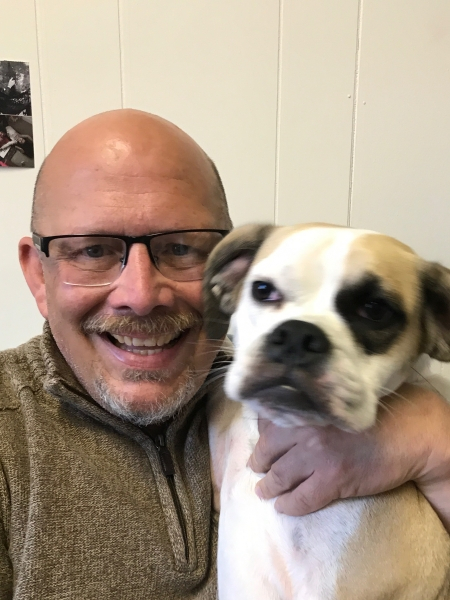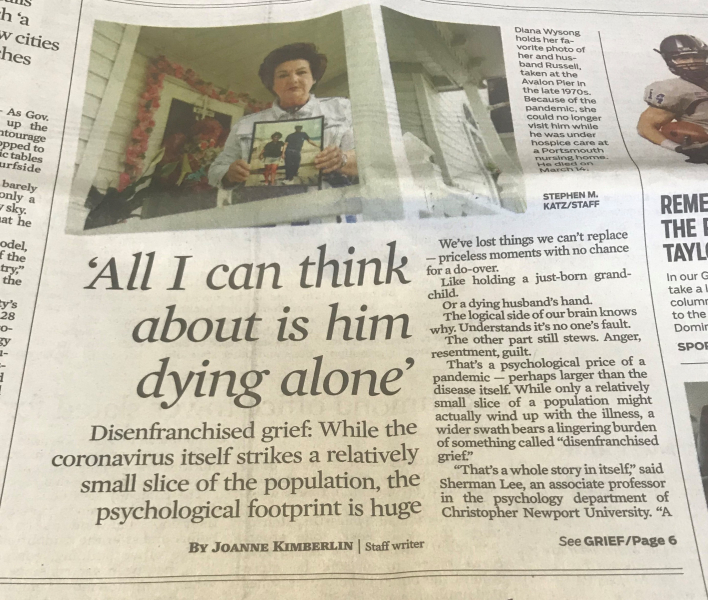Healthy Grieving Techniques

The day I began writing this blog on heathy grieving techniques during this time of pandemic, an article appeared on the front page of the local newspaper, “The Virginia Pilot.” The article speaks of what is known as disenfranchised grief. It is grief that is complicated by factors beyond the loss itself. The article describes the grief of a family that was complicated because they were not able to be with their loved one at the time of his passing. Hence, the bold-typed words “All I can think about is him dying alone.” With the number of deaths from the virus now over 180,000, this experience is one that many people are having. Due to the quarantine which the virus has caused, grief for a number of individuals and families has become intensified and its complexity multi-faceted.
 The article about COVID patient dying alone. Published in The Virgina Pilot
The article about COVID patient dying alone. Published in The Virgina Pilot
The grief brought about by the pandemic, and its complicated nature, is not limited to just that which is experienced because of death. There is the grief which accompanies loss of several different kinds: the loss of employment, the loss of physical contact with others, the loss of routine, possibly the loss of shelter and adequate food, or at least, any certainty of necessities beyond the day. Such losses, likewise, become complex because they can affect our internal sense of worth, our understanding of community, and any felt sense of control over our circumstance, etc. The grief felt in this time is more complex than just that which comes from loss. It can impact, often negatively, how someone understands themselves and the world they live in. The loss itself is difficult enough, the accompanying feelings can seem overwhelming. This is quite possible in our present circumstance.
There are, however, several things we can do to keep from being overwhelmed by our grief.
1. Allow yourself to have an outlet for your feelings. Whether it be a friend, a pastor, a counselor, or a group that is focused on different aspects of grief, find someone you can share yourself with. None of us are meant to handle things alone and this is especially true in a time that is strange to all of us. If you try to keep your grief bottled up inside of you, it will still work its way out. It will often do so in ways that are not healthy, such as anger, indifference, or lethargy. A heart-to-heart phone call with a trusted friend or a video visit with a therapist are things that can happen now.
2. Whether it be a journal or in the form of spoken prayer/meditation, each day identify three things or people you are grateful for. You can even do it both in the morning and the evening. Especially when grief is complicated by other matters, you can feel like you are drowning in it. Taking a few moments to remember what in life is still there to be thankful for will allow you to keep your head above water. It will help you to understand that grief is a part of life, but it is not all of life. Also, in this time when so much of what is happening is beyond your control, you can take time to remember what you can control. Even simple things like keeping your own space clean or remembering to say “thank you” to those who showed you kindness or showing even a single act of kindness toward someone else each day. This helps to remind you that not everything is out of your control.
3. The relationship between body, mind and spirit is extremely important. Thus, in this time of complicated grief it is crucial that you keep physically moving. Exercise your body. Walk. Bicycle. Do some yard work. Try yoga. Exercise is not meant to be a distraction from your grief, it is one way you are proactively dealing with it. Even in times of grief, thirty minutes a day of focused movement can do wonders for your mental, emotional, and spiritual well-being.
Finally, but maybe most importantly, though your grief is your own, remember that others are grieving in this time too. Your grief in time is a personal journey, but the journey through grief need not be an isolating journey. Indeed we are all in this together.
Dr. Mark E. Poindexter has been a Disciples pastor since 1989. In addition to his nearly three decades of congregational ministry, he has served both the regional and general church in numerous ways, including a camp counselor/director for 20 years, co-chair of the Indiana Regional Discernment Task Force, Regional Moderator, and a member of the General Board. He was published in Guild Press’ Best Sermons in Indiana and has written numerous articles about the intersection of faith and culture for the religious blog, [D]mergent. Mark served in the United States Marine Corps from 1980-86. He has also run 13 full or half-marathons, completed five triathlons, and rode his bike covering the state of Indiana four times. In addition, Mark has battled severe depression and is a suicide survivor.
As the health and social services general ministry of the Christian Church (Disciples of Christ), the National Benevolent Association partners with congregations, regions, general ministries, and a variety of Disciples-related health and social service providers to create communities of compassion and care. Founded in 1887 by six women responding to the needs of the day and on their doorsteps, for more than 130 years the NBA has continued to serve “the least of these.” Learn more at www.nbacares.org.